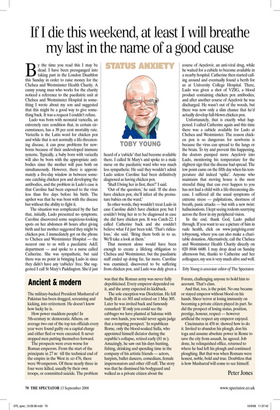If I die this weekend, at least I will breathe my last in the name of a good cause
STATUS ANXIETY
By the time you read this I may be dead. I have been pressganged into taking part in the London Duathlon this Sunday in order to raise money for the Chelsea and Westminster Health Charity. A canny young man who works for the charity noticed a reference to the paediatric unit at Chelsea and Westminster Hospital in something I wrote about my son and suggested that this might be a good way to give something back. It was a request I couldn’t refuse.
Ludo was born with neonatal varicella, an extremely rare condition that, in certain circumstances, has a 30 per cent mortality rate. Varicella is the Latin word for chicken pox and while that is not normally a life-threatening disease, it can pose problems for newborns because of their undeveloped immune systems. Typically, a baby born with varicella will also be born with the appropriate antibodies since the mother will pass both on simultaneously. However, there is approximately a five-day window in between someone catching chicken pox and developing the antibodies, and the problem in Ludo’s case is that Caroline had been exposed to the virus less than five days before his birth. The upshot was that he was born with the disease but without the ability to fight it.
The situation was complicated by the fact that, initially, Ludo presented no symptoms. Caroline discovered some suspicious-looking spots on her abdomen 48 hours after giving birth and her mother suggested they might be chicken pox. I immediately got on the phone to Chelsea and Westminster Hospital — the nearest one to us with a paediatric A&E department — and spoke to a nurse called Catherine. She was sympathetic, but said there was no point in bringing Ludo in since they didn’t have any ‘cubicles’ free. She suggested I call St Mary’s Paddington. She’d just heard of a ‘cubicle’ that had become available there. I called St Mary’s and spoke to a male nurse on the paediatric ward who was much less sympathetic. He said they wouldn’t admit Ludo unless Caroline had been definitively diagnosed as having chicken pox.
‘Shall I bring her in first, then?’ I said.
‘Out of the question,’ he said. ‘If she does have chicken pox, she’ll infect all the premature babies on the ward.’ In other words, they wouldn’t treat Ludo in case Caroline didn’t have chicken pox; but I couldn’t bring her in to be diagnosed in case she did have chicken pox. It was Catch-22. I called Catherine back and she couldn’t believe what I’d just been told. ‘That’s ridiculous,’ she said. ‘Bring them both in to us. We’ll take a look at them.’ That moment alone would have been enough to create a lifelong obligation to Chelsea and Westminster, but the paediatric staff ended up doing far, far more. Caroline was examined, discovered to be suffering from chicken pox, and Ludo was duly given a was that the Roman army was never fully depoliticised. Every emperor depended on it, and the army expected its kickback.
The sole exception was Diocletian. He fell badly ill in AD 303 and retired on 1 May 305. Later he was invited back and famously remarked: ‘If only you could see the cabbages we have planted at Salonae with our own hands, you would never again judge that a tempting prospect.’ In republican Rome, only the blood-soaked Sulla, who appointed himself dictator during the republic’s collapse, retired early (81 BC). Amazingly, he saw out his days hunting, fishing, drinking and spending time in the company of his artistic friends — actors, harpists, ballet dancers, comedians, female impersonators and other riff-raff. The story was that he dismissed his bodyguard and walked as a private citizen about the course of Acyclovir, an anti-viral drug, while he waited for a cubicle to become available in a nearby hospital. Catherine then started calling around and eventually found a berth for us at University College Hospital. There, Ludo was given a shot of VZIG, a blood product containing chicken pox antibodies, and after another course of Acyclovir he was discharged. He wasn’t out of the woods, but there was now only a slim chance that he’d actually develop full-blown chicken pox.
Unfortunately, that is exactly what happened. I called Catherine again and this time there was a cubicle available for Ludo at Chelsea and Westminster. The reason chicken pox is so dangerous for newborns is because the virus can spread to the lungs or the brain. To try and prevent this happening, the doctors pumped more Acyclovir into Ludo, monitoring his temperature for the slightest sign that the disease had spread. The low point came on the fifth day when his temperature did indeed ‘spike’. Anyone who maintains that moving house is the most stressful thing that can ever happen to you has not had a child with a life-threatening disease. I suffered all the usual symptoms of extreme stress — palpitations, shortness of breath, panic attacks — but with a new twist: hallucinations. I kept seeing rodents scurrying across the floor in my peripheral vision.
In the end, thank God, Ludo pulled through. If you want to see a picture of him in rude health, click on www.justgiving.com/ tobyyoung, where you can also make a charitable donation. Alternatively, call the Chelsea and Westminster Health Charity directly on 020 8846 6600. I may drop dead on Sunday afternoon but, thanks to Catherine and her colleagues, my son is very much alive and well.










































































 Previous page
Previous page